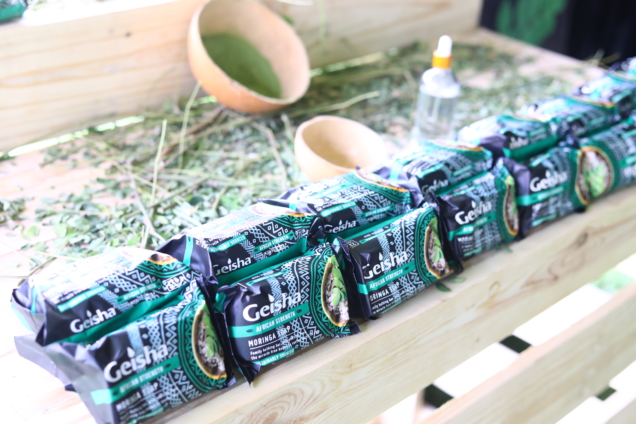The history of soap-like substances can be dated as far back as 2800 BC. Evidently, the first group of people to discover or make soap were the Babylonians, Mesopotamians, Egyptians, Greeks, and Romans.
They discovered that mixing fat, oils, and salts resulted in the production of cleansing agents they could use for the washing of their utensils and also apply as medicine for the treatment of skin diseases. Common soap bars, shower gels and liquid soaps were later formulated and produced as knowledge and technology evolved.
Just as the technology for soap making evolved over the years, Geisha has also transitioned into a family toilet soap which is affordable and comes with new formulae and fragrances, together with a brand-new look and feel. Geisha has a history of being Africa's most loved soap with a "long-lasting" benefit.
As Africa’s most loved soap, it should therefore come as no surprise that the brand has made use of Africa’s most well-kept skincare secrets to formulate its latest range of variants; Geisha Black Soap and Geisha Moringa Oil.
These variants are an improvement of the brand as well as an expression of confidence in the offerings of mother nature which makes available additional natural extracts such as activated charcoal, moringa oil and cocoa butter, that care for the skin naturally to enhance one’s natural skin glow.
Since its inception, Unilever has been committed to taking into consideration the feedback and opinions of customers for further research into making products that better suit their tastes and preferences.
With the evolution of skincare products made from chemicals to those made from natural-based products, it is important that Unilever goes back to its roots, and be inspired by its heritage to produce for customers, products that are safe, affordable, and capable of being used by the whole family.
Geisha soap, in the past, has been available in Aloe vera and honey, Shea butter and honey, as well as Coconut milk and honey. Other variants include the Rose and honey and Lemon and honey range. Now the brand has evolved with inspiration from our sustainably sourced natural ingredients, to add Geisha Moringa and Black soap to the growing list of variants.
Geisha Moringa soap and Geisha Black soap are family bars made with extracts from the miracle tree known to soothe and clear sensitive skin while helping to maintain that natural glow of the skin.
The new Moringa soap helps slow down ageing and improves skin tone, while the black soap is a solid antibacterial soap that helps battle skin inflammation and dermatitis.
Geisha, the preferred soap by many Ghanaians, is still evolving and taking into consideration the ever-dynamic taste and preferences of its consumers. This time around, we at Unilever have decided to evolve making use of some of nature’s best secrets.
****
The writer is the Category Manager, Skin Cleansing with Unilever Ghana
Latest Stories
-
Ghana and Seychelles strengthen bilateral ties with focus on key sectors
31 mins -
National Elections Security Taskforce meets political party heads ahead of December elections
34 mins -
Samsung’s AI-powered innovations honored by Consumer Technology Association
54 mins -
Fugitive Zambian MP arrested in Zimbabwe – minister
1 hour -
Town council in Canada at standstill over refusal to take King’s oath
1 hour -
Trump picks Pam Bondi as attorney general after Matt Gaetz withdraws
2 hours -
Providing quality seeds to farmers is first step towards achieving food security in Ghana
2 hours -
Thousands of PayPal customers report brief outage
2 hours -
Gary Gensler to leave role as SEC chairman
2 hours -
Contraceptive pills recalled in South Africa after mix-up
2 hours -
Patient sues Algerian author over claims he used her in novel
2 hours -
Kenya’s president cancels major deals with Adani Group
3 hours -
COP29: Africa urged to invest in youth to lead fight against climate change
3 hours -
How Kenya’s evangelical president has fallen out with churches
3 hours -
‘Restoring forests or ravaging Ghana’s green heritage?’ – Coalition questions Akufo-Addo’s COP 29 claims
3 hours

